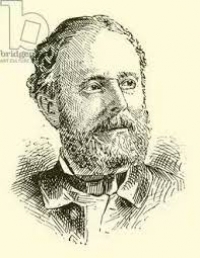Piano Sheet Music
 "... hearing Andres Segovia in person was quite a revelation ... It was a knockout..." Julian Bream
"... hearing Andres Segovia in person was quite a revelation ... It was a knockout..." Julian Bream
The Rolling Stones
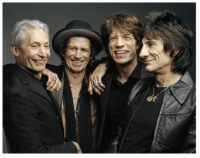
The Rolling Stones are an English band whose music was initially based on rhythm and blues and rock and roll. Formed in London and having their first success in the UK, they subsequently became popular in the US during the "British Invasion" in the early 1960s.
The band formed in 1962 when original leader Brian Jones and pianist Ian Stewart were joined by singer Mick Jagger as lead vocals and guitarist Keith Richards, whose songwriting partnership later contributed to their taking the leadership role in the group. Bassist Bill Wyman and drummer Charlie Watts completed the early lineup. Ian Stewart was removed from the official lineup in 1963 but continued to work with the band as road manager and keyboardist until his death in 1985.
The band's early recordings were mainly covers of American blues and R&B songs. Their 1965 single "(I Can't Get No) Satisfaction" established The Rolling Stones as a premier rock and roll act. Starting with their 1966 album Aftermath, the songs of Jagger and Richards, aided by the instrumental experimentation of Jones, expanded an always present stylistic flexibility. Jones died in 1969 shortly after being fired from the band and was replaced by Mick Taylor. Taylor recorded five albums with The Rolling Stones before quitting in 1974. Former Faces guitarist Ronnie Wood stepped in and has been with the band ever since. Wyman left the Rolling Stones in 1993; bassist Darryl Jones, who is not an official band member, has worked with the group since 1994.
The Rolling Stones have released 22 studio albums in the UK (24 in the US), eight concert albums (nine in the US) and numerous compilations; they have had 32 UK & US top-10 singles, 43 UK & US top-10 albums from 1964 and 2008 and have sold more than 200 million albums worldwide. 1971's Sticky Fingers began a string of eight consecutive studio albums at number one in the United States. In 1989 The Rolling Stones were inducted into the American Rock and Roll Hall of Fame, and in 2004 they were ranked number 4 in Rolling Stone magazine's 100 Greatest Artists of All Time. They are also ranked as the number 2 artists of all time on Acclaimedmusic.net. Their latest studio album, A Bigger Bang, was released in 2005 and followed by the highest-grossing tour in history, which lasted into late summer 2007. During the 1969 American tour, tour manager Sam Cutler introduced them as "The Greatest Rock and Roll Band in the World". Their image of unkempt and surly youth is one that many musicians still emulate.
The band formed in 1962 when original leader Brian Jones and pianist Ian Stewart were joined by singer Mick Jagger as lead vocals and guitarist Keith Richards, whose songwriting partnership later contributed to their taking the leadership role in the group. Bassist Bill Wyman and drummer Charlie Watts completed the early lineup. Ian Stewart was removed from the official lineup in 1963 but continued to work with the band as road manager and keyboardist until his death in 1985.
The band's early recordings were mainly covers of American blues and R&B songs. Their 1965 single "(I Can't Get No) Satisfaction" established The Rolling Stones as a premier rock and roll act. Starting with their 1966 album Aftermath, the songs of Jagger and Richards, aided by the instrumental experimentation of Jones, expanded an always present stylistic flexibility. Jones died in 1969 shortly after being fired from the band and was replaced by Mick Taylor. Taylor recorded five albums with The Rolling Stones before quitting in 1974. Former Faces guitarist Ronnie Wood stepped in and has been with the band ever since. Wyman left the Rolling Stones in 1993; bassist Darryl Jones, who is not an official band member, has worked with the group since 1994.
The Rolling Stones have released 22 studio albums in the UK (24 in the US), eight concert albums (nine in the US) and numerous compilations; they have had 32 UK & US top-10 singles, 43 UK & US top-10 albums from 1964 and 2008 and have sold more than 200 million albums worldwide. 1971's Sticky Fingers began a string of eight consecutive studio albums at number one in the United States. In 1989 The Rolling Stones were inducted into the American Rock and Roll Hall of Fame, and in 2004 they were ranked number 4 in Rolling Stone magazine's 100 Greatest Artists of All Time. They are also ranked as the number 2 artists of all time on Acclaimedmusic.net. Their latest studio album, A Bigger Bang, was released in 2005 and followed by the highest-grossing tour in history, which lasted into late summer 2007. During the 1969 American tour, tour manager Sam Cutler introduced them as "The Greatest Rock and Roll Band in the World". Their image of unkempt and surly youth is one that many musicians still emulate.
Georges Bizet

Georges Bizet (25 October 1838 – 3 June 1875) was a French composer and pianist of the Romantic era. He is best known for the opera Carmen.
Bizet was born at 26 rue de la Tour d'Auvergne in the 9th arrondissement of Paris in 1838. He was registered with the legal name Alexandre César Léopold Bizet, but he was baptised on 16 March 1840 with the first name Georges, and he was always known thereafter as Georges Bizet. His father Adolphe Armand Bizet (1810-86) was an amateur singer and composer, and his mother, Aimée Léopoldine Joséphine née Delsarte (1814-61), was the sister of the famous singing teacher François Delsarte.
He entered the Paris Conservatory of Music on 9 October 1848, a fortnight before his tenth birthday. His teachers there were Pierre Zimmermann (fugue and counterpoint; often assisted by his son-in-law Charles Gounod), Antoine François Marmontel (piano), François Benoist (organ) and, on Zimmermann's death, Fromental Halévy, whose daughter he himself later married. He won first prizes for organ and fugue in 1855 and completed his earliest compositions.
His first symphony, the Symphony in C, was written in November 1855, when he was seventeen, evidently as a student assignment. It was unknown to the world until 1933, when it was discovered in the archives of the Paris Conservatory library. Upon its first performance in 1935, it was immediately hailed as a junior masterwork and a welcome addition to the early Romantic period repertoire. The symphony bears a stylistic resemblance to the first symphony of Gounod, first played earlier in the same year, and which Bizet had arranged for two pianos although present-day listeners may discern a similarity to music of Franz Schubert, whose work was little known in France at the time the symphony was written.
In 1857, a setting of the one-act operetta Le docteur Miracle won him a share in a prize offered by Jacques Offenbach. He also won the music composition scholarship of the Prix de Rome, the conditions of which required him to study in Rome for three years. There, his talent developed as he wrote such works as the opera buffa Don Procopio (1858-59). There he also composed his only major sacred work, Te Deum (1858), which he submitted to the Prix Rodrigues competition, a contest for Prix de Rome winners only. Bizet failed to win the Prix Rodrigues, and the Te Deum score remained unpublished until 1971. He made two attempts to write another symphony in 1859, but destroyed the manuscripts in December of that year. Apart from this period in Rome, Bizet lived in the Paris area all his life.
Shortly after leaving Rome in July 1860, but while still touring in Italy, he had the idea of writing a symphony in which each of the four movements would be a musical evocation of a different Italian city – Rome, Venice, Florence and Naples. On hearing of his mother's serious illness he cut short his Italian travels and returned to Paris in September 1860; she died a year later. The Scherzo of the symphony was completed by November 1861, but it was not until 1866 that the first version of the whole symphony was written. He subjected it to a number of revisions through to 1871, but died before ever producing what he considered the definitive version. For this reason, the work is sometimes described as "unfinished", but this is an inaccurate description as it was fully scored. It was published in 1880 as the Roma Symphony.
Bizet was born at 26 rue de la Tour d'Auvergne in the 9th arrondissement of Paris in 1838. He was registered with the legal name Alexandre César Léopold Bizet, but he was baptised on 16 March 1840 with the first name Georges, and he was always known thereafter as Georges Bizet. His father Adolphe Armand Bizet (1810-86) was an amateur singer and composer, and his mother, Aimée Léopoldine Joséphine née Delsarte (1814-61), was the sister of the famous singing teacher François Delsarte.
He entered the Paris Conservatory of Music on 9 October 1848, a fortnight before his tenth birthday. His teachers there were Pierre Zimmermann (fugue and counterpoint; often assisted by his son-in-law Charles Gounod), Antoine François Marmontel (piano), François Benoist (organ) and, on Zimmermann's death, Fromental Halévy, whose daughter he himself later married. He won first prizes for organ and fugue in 1855 and completed his earliest compositions.
His first symphony, the Symphony in C, was written in November 1855, when he was seventeen, evidently as a student assignment. It was unknown to the world until 1933, when it was discovered in the archives of the Paris Conservatory library. Upon its first performance in 1935, it was immediately hailed as a junior masterwork and a welcome addition to the early Romantic period repertoire. The symphony bears a stylistic resemblance to the first symphony of Gounod, first played earlier in the same year, and which Bizet had arranged for two pianos although present-day listeners may discern a similarity to music of Franz Schubert, whose work was little known in France at the time the symphony was written.
In 1857, a setting of the one-act operetta Le docteur Miracle won him a share in a prize offered by Jacques Offenbach. He also won the music composition scholarship of the Prix de Rome, the conditions of which required him to study in Rome for three years. There, his talent developed as he wrote such works as the opera buffa Don Procopio (1858-59). There he also composed his only major sacred work, Te Deum (1858), which he submitted to the Prix Rodrigues competition, a contest for Prix de Rome winners only. Bizet failed to win the Prix Rodrigues, and the Te Deum score remained unpublished until 1971. He made two attempts to write another symphony in 1859, but destroyed the manuscripts in December of that year. Apart from this period in Rome, Bizet lived in the Paris area all his life.
Shortly after leaving Rome in July 1860, but while still touring in Italy, he had the idea of writing a symphony in which each of the four movements would be a musical evocation of a different Italian city – Rome, Venice, Florence and Naples. On hearing of his mother's serious illness he cut short his Italian travels and returned to Paris in September 1860; she died a year later. The Scherzo of the symphony was completed by November 1861, but it was not until 1866 that the first version of the whole symphony was written. He subjected it to a number of revisions through to 1871, but died before ever producing what he considered the definitive version. For this reason, the work is sometimes described as "unfinished", but this is an inaccurate description as it was fully scored. It was published in 1880 as the Roma Symphony.
The Fray
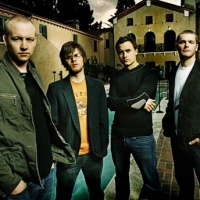
The Fray is a Grammy Award-nominated four-piece piano rock American band from Denver, Colorado. Formed in 2002 by schoolmates Isaac Slade and Joe King, the band released their debut album How to Save a Life in 2005. The band is best known for the song "How to Save a Life", which charted in the top three of the Billboard Hot 100 and was also a top 5 single in Canada, Australia, Ireland, Sweden, and the United Kingdom. The Fray also found national success with the song "Over My Head (Cable Car)", which became a top ten hit in the United States and Canada. How to Save a Life was certified double platinum by the Recording Industry Association of America and was also certified platinum in Australia and New Zealand.
The Fray was formed in 2002, and currently consists of Isaac Slade (vocals and piano), Joe King (guitar and vocals), Dave Welsh (guitar) and Ben Wysocki (drums and percussion). While the band has no official bass guitarist, Dan Lavery of Tonic has been the touring bassist since March 2007. Prior to Dan joining the touring fold, Jimmy Stofer, also a member of the band Hello Kavita, was employed as the band's touring bassist from 2005 through February 2007.
The Fray was formed in 2002, and currently consists of Isaac Slade (vocals and piano), Joe King (guitar and vocals), Dave Welsh (guitar) and Ben Wysocki (drums and percussion). While the band has no official bass guitarist, Dan Lavery of Tonic has been the touring bassist since March 2007. Prior to Dan joining the touring fold, Jimmy Stofer, also a member of the band Hello Kavita, was employed as the band's touring bassist from 2005 through February 2007.
Giovanni Allevi

Giovanni Allevi (; born in Ascoli Piceno, April 9, 1969) is an Italian pianist and composerAllevi attained a "first-class diploma" both in piano at the "F. Morlacchi" conservatoire in Perugia and in composition at the "G. Verdi" academy of music in Milan. He graduated cum laude in Philosophy with a thesis entitled "Il vuoto nella Fisica contemporanea" (The Void in Contemporary Physics) and he attended the Accademia Internazionale di Alto Perfezionamento in Arezzo, under maestro Carlo Alberto Neri.
Lindy Kerby

Lindy Kerby is an inspirational singer, songwriter and speaker. She has written over 300 songs of different genres including musical theater, pop, christian, choral and others. She has 3 professional CD's ("Little Miracles", "Thy God, My God: Strength from the Lives of Biblical Women" and "Reflections of Eternity". ...
American Beauty
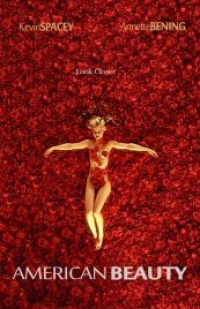
Lester's life seems perfect, having a respectable job and a family, but inside, he is slowly slipping into depression. Struggling with life, he gets infatuated with his daughter's friend, Angela.
Herbert Bittrich

Herbert Bittrich. List of choral works.(born in 1932).
Traditional

B*Witched

B*Witched was an Irish girl group who enjoyed success in both Europe and North America between 1998 and 2000, releasing two albums and eight singles, all of which made the UK Top 20. The original lineup comprised twin sisters Edele and Keavy Lynch, Sinéad O'Carroll and Lindsay Armaou.
B*Witched's first four singles all topped the UK charts, making them the first Irish group to achieve that feat. The group split up in 2002 after being dropped by their record company. In 2006 the Lynch sisters formed a group, Ms. Lynch, which frequently performs B*Witched material at live shows and remains active as of 2008.
B*Witched's first four singles all topped the UK charts, making them the first Irish group to achieve that feat. The group split up in 2002 after being dropped by their record company. In 2006 the Lynch sisters formed a group, Ms. Lynch, which frequently performs B*Witched material at live shows and remains active as of 2008.
kotaro oshio

Kotaro Oshio (押尾コータロー Oshio Kōtarō?) is an acoustic guitarist from Japan. Born in Osaka, on February 1, 1968, he is best known for his work on the steel string guitar. Oshio is a part of Sony Music Japan's SME Records division.
Oshio's music is classified within various categories including pop, new age, and jazz. Oshio's musical technique includes fingerpicking, tap harmonics, and a unique strumming style referred to as a "nail attack" in which he slaps the strings with the nails of his middle and ring fingers which is inspired by Michael Hedges. While his albums include mostly original material, Oshio is also known for his covers and movie soundtracks. His unique skill in interpretation and arrangement can be heard in tracks such as Merry Christmas, Mr. Lawrence from his album Starting Point.
Oshio's music is classified within various categories including pop, new age, and jazz. Oshio's musical technique includes fingerpicking, tap harmonics, and a unique strumming style referred to as a "nail attack" in which he slaps the strings with the nails of his middle and ring fingers which is inspired by Michael Hedges. While his albums include mostly original material, Oshio is also known for his covers and movie soundtracks. His unique skill in interpretation and arrangement can be heard in tracks such as Merry Christmas, Mr. Lawrence from his album Starting Point.
Stephen Pearson

Although my training and career was as a lawyer, my personal worlds were in the mountains and in song. From 1995-2005, I wrote music and lyrics for the 150 Psalms (as well as related devotional music), and established a web site, www.psalmistry.com, to share the work with fellow praise and worship teams. I am now retired from my profession, but not the mountains or music. The changes in music technology continue to add exciting avenues of expression and creation.
Hector Berlioz
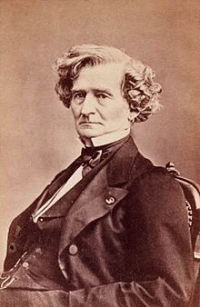
Hector Berlioz (December 11, 1803 – March 8, 1869) was a French Romantic composer, best known for his compositions Symphonie fantastique and Grande messe des morts (Requiem). Berlioz made significant contributions to the modern orchestra with his Treatise on Instrumentation. He specified huge orchestral forces for some of his works; as a conductor, he performed several concerts with more than 1,000 musicians. He also composed around 50 songs. His influence was critical for the further development of Romanticism, especially in composers like Richard Wagner, Nikolai Rimsky-Korsakov, Franz Liszt, Richard Strauss, Gustav Mahler and many others.
Real Book

The Real Book refers to compilations of lead sheets for jazz standards. It usually refers to the first volume of a series of books transcribed and collated by Berklee College of Music students during the 1970s.The name is derived from "fake books", so called because they contained only rough outlines of music pieces rather than fully notated scores. Early fake books were often used by professional bands who performed mostly standards, often more geared to society and dance bands rather than jazz ensembles, and devoted much space to show tunes, novelty tunes, traditional jazz, etc. The first three Real Book volumes, in contrast, contained many bebop and other jazz standards that were likely to be encountered on jazz gigs at the time. For this reason, the books were quickly adopted among jazz players in the 1970s, particularly on the east coast.
Tactics

Tactics (タクティクス, Takutikusu) is a Japanese anime series with 25 episodes. Hiroshi Watanabe directed the series and was produced by Studio Deen. Tactics was licensed and distributed by Manga Entertainment for its English release.
Howard Shore

Howard Leslie Shore (born October 18, 1946) is a Canadian composer, notable for his film scores. He has composed the scores for over 40 films, most notably the scores for The Lord of the Rings film trilogy, for which he won three Academy Awards. He is also a consistent collaborator with director David Cronenberg, having scored all but one of his films since 1979. Shore has also worked with Martin Scorsese, Jonathan Demme, David Fincher and many other filmakers.
He has also composed a few concert works including one opera, The Fly, based on the plot (though not his score) of Cronenberg's 1986 film premiered at the Théâtre du Châtelet in Paris on 2 July 2008., a short piece Fanfare for the Wanamaker Organ and the Philadelphia Orchestra, and a short overture for the Swiss 21st Century Symphony Orchestra.
Shore is a three-time winner of the Academy Award, and has also won two Golden Globe Awards and four Grammy Awards. He is the uncle of film composer Ryan Shore.
He has also composed a few concert works including one opera, The Fly, based on the plot (though not his score) of Cronenberg's 1986 film premiered at the Théâtre du Châtelet in Paris on 2 July 2008., a short piece Fanfare for the Wanamaker Organ and the Philadelphia Orchestra, and a short overture for the Swiss 21st Century Symphony Orchestra.
Shore is a three-time winner of the Academy Award, and has also won two Golden Globe Awards and four Grammy Awards. He is the uncle of film composer Ryan Shore.
Zez Confrey
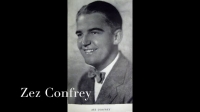
Edward Elzear "Zez" Confrey was an American composer and performer of novelty piano and jazz music. His most noted works were "Kitten on the Keys" and "Dizzy Fingers." Studying at the Chicago Musical College and becoming enthralled by French impressionists played a critical role in how he composed and performed music.
Elvis Presley

Elvis Aaron Presley (January 8, 1935–August 16, 1977, middle name sometimes written Aron)a was an American singer, musician and actor. A cultural icon, he is commonly referred to as the "The King of Rock 'n' Roll" or "The King".
In 1954, Presley began his career as the first performer of rockabilly, an uptempo fusion of country and rhythm and blues with a strong back beat. His novel versions of existing songs, mixing "black" and "white" sounds, made him popular—and controversial—as did his uninhibited stage and television performances. He recorded songs in the rock and roll genre, with tracks like "Hound Dog" and "Jailhouse Rock" later embodying the style. Presley had a versatile voice and had unusually wide success encompassing other genres, including gospel, blues, ballads and pop. To date, he has been inducted into four music halls of fame.
In the 1960s, Presley made the majority of his thirty-one movies—mainly poorly reviewed, but financially successful, musicals. In 1968, he returned with acclaim to live music in a television special, and thereafter performed across the U.S., notably in Las Vegas. Throughout his career, he set records for concert attendance, television ratings and recordings sales. He is one of the best-selling and most influential artists in the history of popular music. Health problems, drug dependency and other factors led to his premature death at age 42.
In 1954, Presley began his career as the first performer of rockabilly, an uptempo fusion of country and rhythm and blues with a strong back beat. His novel versions of existing songs, mixing "black" and "white" sounds, made him popular—and controversial—as did his uninhibited stage and television performances. He recorded songs in the rock and roll genre, with tracks like "Hound Dog" and "Jailhouse Rock" later embodying the style. Presley had a versatile voice and had unusually wide success encompassing other genres, including gospel, blues, ballads and pop. To date, he has been inducted into four music halls of fame.
In the 1960s, Presley made the majority of his thirty-one movies—mainly poorly reviewed, but financially successful, musicals. In 1968, he returned with acclaim to live music in a television special, and thereafter performed across the U.S., notably in Las Vegas. Throughout his career, he set records for concert attendance, television ratings and recordings sales. He is one of the best-selling and most influential artists in the history of popular music. Health problems, drug dependency and other factors led to his premature death at age 42.
Kings of Leon

Kings of Leon is an American rock band that formed in Nashville, Tennessee in 1999, consisting of brothers Anthony Caleb Followill (lead vocals, rhythm guitar), Ivan Nathan Followill (drums, percussion, backing vocals) and Michael Jared Followill (bass guitar, backing vocals), with their cousin Cameron Matthew Followill (lead guitar, backing vocals). Each member of the family group is known by his middle name (second given name) as opposed to his first given name.
The band's early music was an upbeat blend of southern rock and blues influences but the band has gradually expanded their sound to include a variety of genres and a more alternative sound. Kings of Leon achieved initial success in the United Kingdom with nine Top 40 singles, two BRIT Awards in 2008, and all three of the band's albums at the time peaking in the top five of the UK Albums Chart. Their third album Because of the Times also reached the #1 spot. After the release of Only by the Night in September 2008 they finally achieved chart success in their native United States. The singles "Sex on Fire", "Use Somebody" and "Notion" all peaked at #1 on the Hot Modern Rock Tracks. The album itself was their first ever platinum-selling album in the United States, was the best selling album in Australia of 2008, certified 8x Platinum and achieved 5x Platinum certification in the United Kingdom.
The band's early music was an upbeat blend of southern rock and blues influences but the band has gradually expanded their sound to include a variety of genres and a more alternative sound. Kings of Leon achieved initial success in the United Kingdom with nine Top 40 singles, two BRIT Awards in 2008, and all three of the band's albums at the time peaking in the top five of the UK Albums Chart. Their third album Because of the Times also reached the #1 spot. After the release of Only by the Night in September 2008 they finally achieved chart success in their native United States. The singles "Sex on Fire", "Use Somebody" and "Notion" all peaked at #1 on the Hot Modern Rock Tracks. The album itself was their first ever platinum-selling album in the United States, was the best selling album in Australia of 2008, certified 8x Platinum and achieved 5x Platinum certification in the United Kingdom.
Francisco Vila
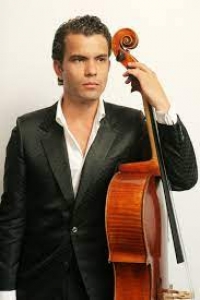
Ecuadorian cellist Francisco Vila is a soloist and chamber musician known for his sensitivity, elegance of phrasing and technical mastery of the instrument. He began playing the cello at age 8 and had his solo debut with orchestra at 14. Concert activities have taken him throughout Asia, Europe, North and South America. The Bloomington Herald-Times said of his performance of Lalo’s Cello Concerto that Vila “…displayed absolute command on stage…perfectly executed technical passages and induced the orchestra with his energy… tenderly revealed to us the romanticism of this concerto.”
David Foster
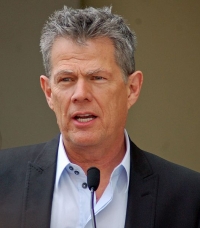
David Walter Foster, OC, OBC (born November 1, 1949), is a Canadian musician, record producer, composer, singer, songwriter and arranger, noted for discovering singers Celine Dion, Josh Groban, and Michael Bublé and for producing some of the most successful artists in the world.
Bach

Johann Sebastian Bach (31 March 1685 – 28 July 1750) was a German composer and organist whose sacred and secular works for choir, orchestra, and solo instruments drew together the strands of the Baroque period and brought it to its ultimate maturity. Although he introduced no new forms, he enriched the prevailing German style with a robust contrapuntal technique, an unrivalled control of harmonic and motivic organisation in composition for diverse musical forces, and the adaptation of rhythms and textures from abroad, particularly Italy and France.
Revered for their intellectual depth and technical and artistic beauty, Bach's works include the Brandenburg concertos; the Goldberg Variations; the English Suites, French Suites, Partitas, and Well-Tempered Clavier; the Mass in B Minor; the St. Matthew Passion; the St. John Passion; The Musical Offering; The Art of Fugue; the Sonatas and Partitas for violin solo; the Cello Suites; more than 200 surviving cantatas; and a similar number of organ works, including the celebrated Toccata and Fugue in D Minor.
While Bach's fame as an organist was great during his lifetime, he was not particularly well-known as a composer. His adherence to Baroque forms and contrapuntal style was considered "old-fashioned" by his contemporaries, especially late in his career when the musical fashion tended towards Rococo and later Classical styles. A revival of interest and performances of his music began early in the 19th century, and he is now widely considered to be one of the greatest composers in the Western tradition.
Revered for their intellectual depth and technical and artistic beauty, Bach's works include the Brandenburg concertos; the Goldberg Variations; the English Suites, French Suites, Partitas, and Well-Tempered Clavier; the Mass in B Minor; the St. Matthew Passion; the St. John Passion; The Musical Offering; The Art of Fugue; the Sonatas and Partitas for violin solo; the Cello Suites; more than 200 surviving cantatas; and a similar number of organ works, including the celebrated Toccata and Fugue in D Minor.
While Bach's fame as an organist was great during his lifetime, he was not particularly well-known as a composer. His adherence to Baroque forms and contrapuntal style was considered "old-fashioned" by his contemporaries, especially late in his career when the musical fashion tended towards Rococo and later Classical styles. A revival of interest and performances of his music began early in the 19th century, and he is now widely considered to be one of the greatest composers in the Western tradition.
Czerny
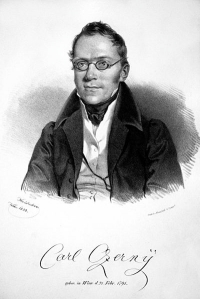
Carl Czerny (sometimes Karl; February 21, 1791 – July 15, 1857) was an Austrian pianist, composer and teacher. He is best remembered today for his books of études for the piano. Czerny knew and was influenced by the well-known pianists Muzio Clementi and Johann Nepomuk Hummel.
Train
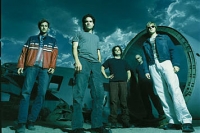
Train is a Grammy Award winning rock band formed in San Francisco, California. To date, three of their albums have peaked in the top 10 of the Billboard 200 and have sold a total of over 4 million albums in the US. Three of their songs have been top 20 hits on the Billboard Hot 100 including their biggest hit "Drops of Jupiter (Tell Me)". Train has found success on modern adult contemporary radio stations, where they have had eight songs in the top 20 of the Hot Adult Top 40 Tracks chart.
Members:
Patrick Monahan
Scott Underwood
Jimmy Stafford
Brandon Bush
Johnny Colt
Members:
Patrick Monahan
Scott Underwood
Jimmy Stafford
Brandon Bush
Johnny Colt
Chopin

Frédéric Chopin (1 March 1810 – 17 October 1849) was a Polish composer and virtuoso pianist of the Romantic period. He is widely regarded as the greatest Polish composer, and ranks as one of music's greatest tone poets.
He was born in the village of Żelazowa Wola, in the Duchy of Warsaw, to a Polish mother and French-expatriate father, and in his early life was regarded as a child-prodigy pianist. In November 1830, at the age of 20, Chopin went abroad; following the suppression of the Polish November Uprising of 1830–31, he became one of many expatriates of the Polish "Great Emigration."
In Paris, he made a comfortable living as a composer and piano teacher, while giving few public performances. A Polish patriot,
Chopin's extant compositions were written primarily for the piano as a solo instrument. Though technically demanding, Chopin's style emphasizes nuance and expressive depth rather than virtuosity. Chopin invented musical forms such as the ballade and was responsible for major innovations in forms such as the piano sonata, waltz, nocturne, étude, impromptu and prelude. His works are mainstays of Romanticism in 19th-century classical music.
He was born in the village of Żelazowa Wola, in the Duchy of Warsaw, to a Polish mother and French-expatriate father, and in his early life was regarded as a child-prodigy pianist. In November 1830, at the age of 20, Chopin went abroad; following the suppression of the Polish November Uprising of 1830–31, he became one of many expatriates of the Polish "Great Emigration."
In Paris, he made a comfortable living as a composer and piano teacher, while giving few public performances. A Polish patriot,
Chopin's extant compositions were written primarily for the piano as a solo instrument. Though technically demanding, Chopin's style emphasizes nuance and expressive depth rather than virtuosity. Chopin invented musical forms such as the ballade and was responsible for major innovations in forms such as the piano sonata, waltz, nocturne, étude, impromptu and prelude. His works are mainstays of Romanticism in 19th-century classical music.
Michael Daly
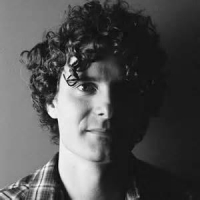
Mike Daly is an American record producer, songwriter, and multi-instrumentalist. Daly attended the Berklee College of Music in Boston, graduating in 1994. Daly first came to prominence as the Whiskeytown resident multi-instrumentalist and co-writer. He wrote or co-wrote many of the songs on the Pneumonia album and has contributed to all of Caitlin Cary's solo releases.Daly has gone on to have a successful career as a studio musician, songwriter, and producer. He's worked with many artists in a range of different genres including Jason Mraz, Lana Del Rey, Imagine Dragons, Young the Giant, Grace Potter and the Nocturnals, The Plain White T's, and Jimmy Barnes.
Ney Conceicao

Ney Conceição, a self-taught musician, moved to Rio de Janeiro in 1996 after years of working in the local scene of the Amazon. In Rio, he has been participating as a session man on several records by noted Brazilian instrumentalists and singers. His role at the recording of the soundtrack for the film Amazonian Legends was acknowledged by the composer Sebastião Tapajós, with whom Conceição performs regularly.
Rachmaninoff

Sergei Vasilievich Rachmaninoff (1 April 1873 - 28 March 1943) was a Russian composer, pianist, and conductor. He was one of the finest pianists of his day and, as a composer, the last great representative of Russian late Romanticism in classical music. Early influences of Tchaikovsky, Rimsky-Korsakov and other Russian composers gave way to a thoroughly personal idiom which included a pronounced lyricism, expressive breadth, structural ingenuity and a tonal palette of rich, distinctive orchestral colors.
Understandably, the piano figures prominently in Rachmaninoff's compositional output, either as a solo instrument or as part of an ensemble. He made it a point, however, to use his own skills as a performer to explore fully the expressive possibilities of the instrument. Even in his earliest works, he revealed a sure grasp of idiomatic piano writing and a striking gift for melody. In some of his early orchestral pieces he showed the first signs of a talent for tone painting, which he would perfect in The Isle of the Dead, and he began to show a similar penchant for vocal writing in two early sets of songs, Opp. 4 and 8. Rachmaninoff's masterpiece, however, is his choral symphony The Bells, in which all of his talents are fused and unified.
Rachmaninoff sometimes felt threatened by the success of modernists such as Scriabin and Prokofiev and wondered whether to cease composing even before he left Russia. His musical philosophy was rooted in the Russian spiritual tradition, where the role of the artist was to create beauty and to speak the truth from the depths of his heart. In his last major interview, in 1941, he admitted his music, like Russian music, was a product of his temperament. He said, on another occasion, "The new kind of music seems to create not from the heart but from the head. Its composers think rather than feel. They have not the capacity to make their works exalt—they meditate, protest, analyze, reason, calculate and brood, but they do not exalt."
Understandably, the piano figures prominently in Rachmaninoff's compositional output, either as a solo instrument or as part of an ensemble. He made it a point, however, to use his own skills as a performer to explore fully the expressive possibilities of the instrument. Even in his earliest works, he revealed a sure grasp of idiomatic piano writing and a striking gift for melody. In some of his early orchestral pieces he showed the first signs of a talent for tone painting, which he would perfect in The Isle of the Dead, and he began to show a similar penchant for vocal writing in two early sets of songs, Opp. 4 and 8. Rachmaninoff's masterpiece, however, is his choral symphony The Bells, in which all of his talents are fused and unified.
Rachmaninoff sometimes felt threatened by the success of modernists such as Scriabin and Prokofiev and wondered whether to cease composing even before he left Russia. His musical philosophy was rooted in the Russian spiritual tradition, where the role of the artist was to create beauty and to speak the truth from the depths of his heart. In his last major interview, in 1941, he admitted his music, like Russian music, was a product of his temperament. He said, on another occasion, "The new kind of music seems to create not from the heart but from the head. Its composers think rather than feel. They have not the capacity to make their works exalt—they meditate, protest, analyze, reason, calculate and brood, but they do not exalt."
Hiroaki Honshuku

Hiroaki Honshuku Musical artist Say No to Drag Are You Blue · 1995 A-No-Ne Are You Blue · 1995 Not That Silent Night
Not That Silent Night · 2006
Not That Silent Night · 2006
George Williams
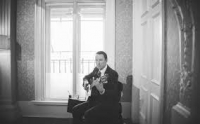
George Dale "The Fox" Williams was a musician, composer, and an arranger for a number of major big bands, including Jimmie Lunceford, Glenn Miller, Gene Krupa, Sonny Dunham, and Ray Anthony.
Johann Strauss

Johann Strauss I (March 14, 1804 – September 25, 1849; German: Johann Baptist Strauß, Johann Strauss (Vater); also Johann Baptist Strauss, Johann Strauss, Sr., the Elder, the Father), born in Vienna, was an Austrian Romantic composer famous for his waltzes, and for popularizing them alongside Joseph Lanner, thereby setting the foundations for his sons to carry on his musical dynasty. His most famous piece is probably the Radetzky March (named after Joseph Radetzky von Radetz), while his most famous waltz is probably the Lorelei Rheinklänge, Op. 154.
OneRepublic
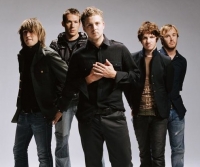
OneRepublic is an American Rock band formed in Colorado. After a few years of moderate success, they have since drawn mainstream attention with the release of their single "Apologize," which has sold in excess of 7 million singles worldwide. The song, according to SoundScan Data, is one of only two songs that have reached 3 million legal downloads in history. A remix of "Apologize" was featured on Timbaland's Shock Value and the band's debut album, Dreaming Out Loud, produced by Greg Wells. Their debut album was released in the United States on November 20, 2007, with international release dates staggered throughout early 2008. As of June 14, 2008, Dreaming Out Loud had sold 761,298 copies in the U.S. with the bands total album sales coming to over 1.5 million worldwide so far. The band's second single, "Stop and Stare," has also crossed the 2 million mark in terms of worldwide single sales. Their third single, "Say (All I Need)", has been released in the UK and in the U.S. Their fourth single will be "Mercy", as stated by OneRepublic's MySpace page. The video has been streamed on Youtube.com.
Current members:
Ryan Tedder – Lead vocals, Guitar, Bass Guitar, Piano, Glockenspiel, Drums (2002–present)
Zach Filkins – Guitar, vocals (2002–present)
Drew Brown – Guitar, Bass Guitar, Glockenspiel (2002–present)
Eddie Fisher – Drums, percussion (2005–present)
Brent Kutzle – Bass guitar, keyboards, cello, vocals (2007–present)
Current members:
Ryan Tedder – Lead vocals, Guitar, Bass Guitar, Piano, Glockenspiel, Drums (2002–present)
Zach Filkins – Guitar, vocals (2002–present)
Drew Brown – Guitar, Bass Guitar, Glockenspiel (2002–present)
Eddie Fisher – Drums, percussion (2005–present)
Brent Kutzle – Bass guitar, keyboards, cello, vocals (2007–present)
Debussy

Achille-Claude Debussy (August 22, 1862 – March 25, 1918) was a French composer. Along with Maurice Ravel, he is considered one of the most prominent figures working within the field of Impressionist music, though he himself intensely disliked the term when applied to his compositions. Debussy was not only among the most important of all French composers but also was a central figure in all European music at the turn of the twentieth century.
Debussy's music virtually defines the transition from late-Romantic music to twentieth century modernist music. In French literary circles, the style of this period was known as Symbolism, a movement that directly inspired Debussy both as a composer and as an active cultural participant.
Debussy's music virtually defines the transition from late-Romantic music to twentieth century modernist music. In French literary circles, the style of this period was known as Symbolism, a movement that directly inspired Debussy both as a composer and as an active cultural participant.
Eric Coates
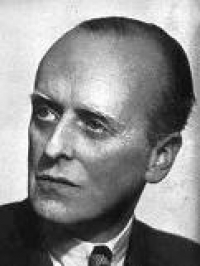
Eric Coates (27 August 1886 – 21 December 1957) was an English composer of light music and a viola player.
Jason Mraz
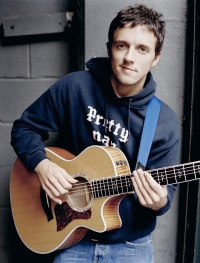
Jason Thomas Mraz (born June 23, 1977) is a singer-songwriter, born and raised in Mechanicsville, Hanover County, Virginia, a suburb of Richmond.
Mraz is an eclectic artist with multiple and varied stylistic influences, including pop, rock, folk, jazz, and hip hop. He has played with various artists, including The Rolling Stones, Bob Dylan, Dave Matthews Band, James Blunt, Gavin DeGraw, Paula Cole, John Popper, Alanis Morissette, The Ohio Players, Rachael Yamagata, James Morrison, Jewel and Colbie Caillat.
Mraz is an eclectic artist with multiple and varied stylistic influences, including pop, rock, folk, jazz, and hip hop. He has played with various artists, including The Rolling Stones, Bob Dylan, Dave Matthews Band, James Blunt, Gavin DeGraw, Paula Cole, John Popper, Alanis Morissette, The Ohio Players, Rachael Yamagata, James Morrison, Jewel and Colbie Caillat.
Eli Bolin
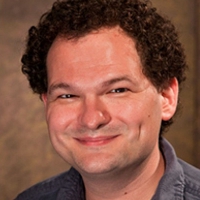
ELI BOLIN is an Emmy-nominated composer & lyricist for theater and television.
For television, Eli wrote the songs for DOCUMENTARY NOW’s ‘Original Cast Album: Co-op’ with John Mulaney and Seth Meyers. Their song ‘Holiday Party (I Did A Little Cocaine Tonight)’ was nominated for an Emmy for Outstanding Original Music & Lyrics.
For television, Eli wrote the songs for DOCUMENTARY NOW’s ‘Original Cast Album: Co-op’ with John Mulaney and Seth Meyers. Their song ‘Holiday Party (I Did A Little Cocaine Tonight)’ was nominated for an Emmy for Outstanding Original Music & Lyrics.
The Rocket Summer

The Rocket Summer is the solo-project of Bryce Avary, a multi-instrumentalist, singer-songwriter, and record producer based in Dallas–Fort Worth, Texas. He writes and produces every song on his records, and plays every instrument on them. He has released seven studio albums and several EPs.
Miklos Rozsa
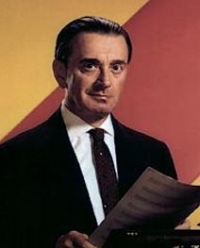
Miklós Rózsa (Hungarian: ; 18 April 1907 – 27 July 1995) was a Hungarian-American composer trained in Germany (1925–1931), and active in France (1931–1935), the United Kingdom (1935–1940), and the United States (1940–1995), with extensive sojourns in Italy from 1953. Best known for his nearly one hundred film scores, he nevertheless maintained a steadfast allegiance to absolute concert music throughout what he called his "double life."
Rózsa achieved early success in Europe with his orchestral Theme, Variations, and Finale (Op. 13) of 1933 and became prominent in the film industry from such early scores as The Four Feathers (1939) and The Thief of Bagdad (1940). The latter project brought him to America when production was transferred from wartime Britain, and Rózsa remained in the United States, becoming an American citizen in 1946. His notable Hollywood career earned him considerable fame, earning 17 Academy Award nominations including winning for Spellbound (1945), A Double Life (1947), and Ben-Hur (1959), while his concert works were championed by such major artists as Jascha Heifetz, Gregor Piatigorsky, and János Starker.
Rózsa achieved early success in Europe with his orchestral Theme, Variations, and Finale (Op. 13) of 1933 and became prominent in the film industry from such early scores as The Four Feathers (1939) and The Thief of Bagdad (1940). The latter project brought him to America when production was transferred from wartime Britain, and Rózsa remained in the United States, becoming an American citizen in 1946. His notable Hollywood career earned him considerable fame, earning 17 Academy Award nominations including winning for Spellbound (1945), A Double Life (1947), and Ben-Hur (1959), while his concert works were championed by such major artists as Jascha Heifetz, Gregor Piatigorsky, and János Starker.
Chet Baker
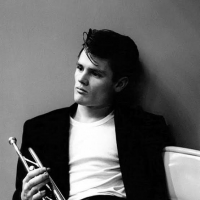
Chesney Henry Baker Jr. was an American jazz trumpeter and vocalist. Baker earned much attention and critical praise through the 1950s, particularly for albums featuring his vocals. Jazz historian Dave Gelly described the promise of Baker's early career as "James Dean, Sinatra, and Bix, rolled into one."
Alanis Morissette

Alanis Nadine Morissette (born June 1, 1974) is a Canadian-born singer-songwriter, record producer, and actress. She has won 12 Juno Awards and seven Grammy Awards, and has sold over 55 million albums worldwide. Morissette began her career in Canada, and as a teenager recorded two dance-pop albums, Alanis and Now Is the Time, under MCA Records. Her international debut album was the rock-influenced Jagged Little Pill, which remains the best-selling debut album by a female artist in the U.S., and the highest selling debut album worldwide in music history, selling 30 million records worlwide. According to RIAA and United World Charts, Alanis is the biggest selling female rock artist in music. Her following album, Supposed Former Infatuation Junkie, was released in 1998 and was a success as well. Morissette took up producing duties for her subsequent albums, which include Under Rug Swept, So-Called Chaos and latest release Flavors of Entanglement. In February 2005, Morissette became a naturalized citizen of the United States while maintaining her Canadian citizenship.
Brahms

Johannes Brahms (May 7, 1833 â April 3, 1897) was a German composer of the Romantic period. He was born in Hamburg and in his later years he settled in Vienna, Austria.
Brahms maintained a Classical sense of form and order in his works â in contrast to the opulence of the music of many of his contemporaries. Thus many admirers (though not necessarily Brahms himself) saw him as the champion of traditional forms and "pure music," as opposed to the New German embrace of program music.
Brahms venerated Beethoven: in the composer's home, a marble bust of Beethoven looked down on the spot where he composed, and some passages in his works are reminiscent of Beethoven's style. The main theme of the finale of Brahms's First Symphony is reminiscent of the main theme of the finale of Beethoven's Ninth, and when this resemblance was pointed out to Brahms he replied that any ass â jeder Esel â could see that.
Ein deutsches Requiem was partially inspired by his mother's death in 1865, but also incorporates material from a Symphony he started in 1854, but abandoned following Schumann's suicide attempt. He once wrote that the Requiem "belonged to Schumann". The first movement of this abandoned Symphony was re-worked as the first movement of the First Piano Concerto.
Brahms also loved the Classical composers Mozart and Haydn. He collected first editions and autographs of their works, and edited performing editions. He also studied the music of pre-classical composers, including Giovanni Gabrieli, Johann Adolph Hasse, Heinrich Schütz and especially Johann Sebastian Bach. His friends included leading musicologists, and with Friedrich Chrysander he edited an edition of the works of François Couperin. He looked to older music for inspiration in the arts of strict counterpoint; the themes of some of his works are modelled on Baroque sources, such as Bach's The Art of Fugue in the fugal finale of Cello Sonata No. 1, or the same composer's Cantata No. 150 in the passacaglia theme of the Fourth Symphony's finale.
Brahms maintained a Classical sense of form and order in his works â in contrast to the opulence of the music of many of his contemporaries. Thus many admirers (though not necessarily Brahms himself) saw him as the champion of traditional forms and "pure music," as opposed to the New German embrace of program music.
Brahms venerated Beethoven: in the composer's home, a marble bust of Beethoven looked down on the spot where he composed, and some passages in his works are reminiscent of Beethoven's style. The main theme of the finale of Brahms's First Symphony is reminiscent of the main theme of the finale of Beethoven's Ninth, and when this resemblance was pointed out to Brahms he replied that any ass â jeder Esel â could see that.
Ein deutsches Requiem was partially inspired by his mother's death in 1865, but also incorporates material from a Symphony he started in 1854, but abandoned following Schumann's suicide attempt. He once wrote that the Requiem "belonged to Schumann". The first movement of this abandoned Symphony was re-worked as the first movement of the First Piano Concerto.
Brahms also loved the Classical composers Mozart and Haydn. He collected first editions and autographs of their works, and edited performing editions. He also studied the music of pre-classical composers, including Giovanni Gabrieli, Johann Adolph Hasse, Heinrich Schütz and especially Johann Sebastian Bach. His friends included leading musicologists, and with Friedrich Chrysander he edited an edition of the works of François Couperin. He looked to older music for inspiration in the arts of strict counterpoint; the themes of some of his works are modelled on Baroque sources, such as Bach's The Art of Fugue in the fugal finale of Cello Sonata No. 1, or the same composer's Cantata No. 150 in the passacaglia theme of the Fourth Symphony's finale.
Fruits Basket

After a family tragedy turns her life upside down, plucky high schooler Tohru Honda takes matters into her own hands and moves out...into a tent! Unfortunately for her, she pitches her new home on private land belonging to the mysterious Sohma clan, and it isn't long before the owners discover her secret. But, as Tohru quickly finds out when the family offers to take her in, the Sohmas have a secret of their own--when touched by the opposite sex, they turn into the animals of the Chinese Zodiac! But this curse has a history of abuse, isolation, ostracization, fear, and pain behind it, which has caused much suffering and broken many Sohmas. Despite this, Tohru may just be able to heal the Sohmas hearts and soothe their souls, and even break the curse once and for all.
David Haas
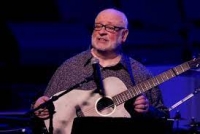
David Robert Haas (born 1957 in Bridgeport, Michigan) is an American author and composer of contemporary Catholic liturgical musicIn 2020, dozens of women accused him of sexual misconduct spanning several decades, and he issued a public apology for harmful behavior.
Edmund H. Sears
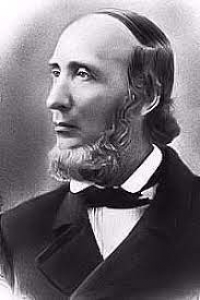
Edmund Hamilton Sears (April 6, 1810 – January 14, 1876) was an American Unitarian parish minister and author who wrote a number of theological works influencing 19th-century liberal Protestants. Today, Sears is primarily known as the man who penned the words to "It Came Upon the Midnight Clear" in 1849. It has been sung to two tunes, one by Richard Storrs Willis and another adapted by Arthur Sullivan from a traditional English air.Sears originally wrote the song as a melancholy reflection on his times while a minister in Wayland, Massachusetts, US. However, "It Came Upon the Midnight Clear" has since become a popular Christmas carol.
Dave Mincy
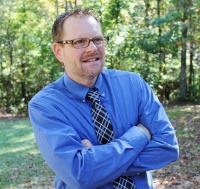
Dave Mincy a musician desiring to positively impact others for Christ through this wonderful gift we call music.
Bill Withers
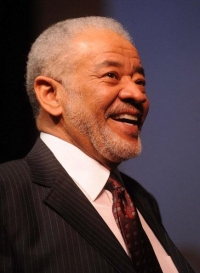
Bill Withers (born July 4, 1938 in Slab Fork, West Virginia) is an American singer-songwriter who performed and recorded from the late 1960s until the mid 1980s. Some of his best-known songs are "Ain't No Sunshine," "Use Me," "Lovely Day," "Lean on Me", "Grandma's Hands" and "Just the Two of Us".
Esperanza Spalding

Esperanza Spalding (born 1984) is an American multi-instrumentalist best known as a jazz bassist and singer, who draws upon many genres in her own compositions. In 2011, she won the Grammy Award for Best New Artist at the 53rd Grammy Awards, making her the first jazz artist to win the award.
Spring Awakening
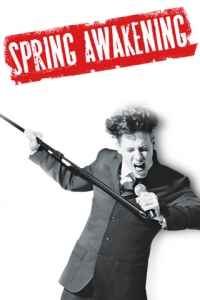
Spring Awakening is a Tony Award-winning rock musical with music by Duncan Sheik and book and lyrics by Steven Sater. The musical is based on the controversial 1891 German play of the same title by Frank Wedekind. Set in late-nineteenth century Germany, it concerns teenagers who are discovering the inner and outer tumult of sexuality. The original play was banned in Germany due to its portrayal of masturbation, abortion, rape and suicide. In the musical, alt-rock is employed as part of the folk-infused rock score. During the musical, characters sometimes break the fourth wall to express their motivations and desires directly to the audience.
After a number of workshops, concerts and rewrites over a seven-year period, Spring Awakening premiered Off-Broadway at the Atlantic Theatre Company on May 19, 2006 and ran through August 17, 2006. The show then opened on Broadway at the Eugene O'Neill Theatre on December 10, 2006 and received favorable reviews. Spring Awakening received eleven 2007 Tony Award nominations, winning eight, including Tonys for best musical, direction, book, score and featured actor. The show also won four Drama Desk Awards, including Outstanding Musical. The production is directed by Michael Mayer and choreographed by Bill T. Jones.
After a number of workshops, concerts and rewrites over a seven-year period, Spring Awakening premiered Off-Broadway at the Atlantic Theatre Company on May 19, 2006 and ran through August 17, 2006. The show then opened on Broadway at the Eugene O'Neill Theatre on December 10, 2006 and received favorable reviews. Spring Awakening received eleven 2007 Tony Award nominations, winning eight, including Tonys for best musical, direction, book, score and featured actor. The show also won four Drama Desk Awards, including Outstanding Musical. The production is directed by Michael Mayer and choreographed by Bill T. Jones.
Music theory

Music theory is the study of the practices and possibilities of music. The Oxford Companion to Music describes three interrelated uses of the term "music theory"
Sidney Prosen
Sidney Prosen Popular music Portraits Scores Vocal scores Parts (Music) Notated music.
Show Luo

Show Lo Chih Hsiang (simplified Chinese: 罗志祥; traditional Chinese: 羅志祥; pinyin: Luó Zhìxiáng; born July 30, 1979) is a Taiwanese singer, actor and host. He is commonly known by his nickname Hsiao Chu (Little Pig) (Chinese: 小豬). Lo is recognized for his trademark dance music and comedic talent. He has over 50 million followers on Chinese micro-blogging platform Weibo as of June 2018.
 Sheet Music Mobile is a site for those who wants to access popular sheet music easily,
letting them download the sheet music for free for trial purposes.
It's completely free to download and try the listed sheet music, but you have to delete the files after 24 hours of trial.
Don't forget, if you like the piece of music you have just learned playing,
treat the artist with respect, and go buy the original sheet music.
Sheet Music Mobile is a site for those who wants to access popular sheet music easily,
letting them download the sheet music for free for trial purposes.
It's completely free to download and try the listed sheet music, but you have to delete the files after 24 hours of trial.
Don't forget, if you like the piece of music you have just learned playing,
treat the artist with respect, and go buy the original sheet music.

